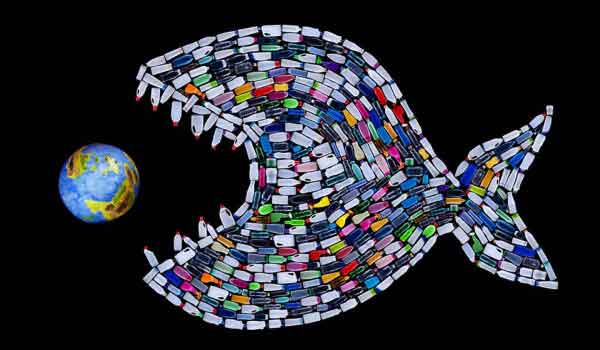By Dr. Robert Holcomb MD, Ph.D., Inventor and Co-Founder of Holcomb Energy System
In the years since The Graduate was made, we all know that sage advice has been widely adopted. Every year produces a global tsunami of 300 million tonnes of plastic — equivalent to the weight of the entire human population! Less than 10% of the plastic used around the world actually gets recycled. If we continue down this same trajectory, by 2050 there will be more plastic in the ocean than fish.
And plastic is in our bodies. Average Americans consume around 122,000 plastic particles every year, which — surprise! — is causing a vast array of health problems.
Yes, we are overwhelmed with plastics and our big problem is only getting bigger.
Plastic is manufactured from crude oil, an important commodity to the industry. Around 8–10% of all global crude oil supply goes to the production of plastic, a number that is expected to grow dramatically. “From 2020 to 2040, BP expects plastics to represent 95 percent of the net growth in demand for oil.”

More plastics is a really big problem. Just look at the Western and Eastern Pacific Garbage Patches — monstrous islands of garbage. The Western patch is roughly double the size of Texas. And that’s just the plastic and trash we can see from the surface. Researchers have discovered a very large landfill on the bottom of the ocean, as nearly 70% of debris sinks to the ocean floor. That’s an isolated mountain of debris kept together by currents, but the real problem is even greater in size.
Our oceans produce 10% of oxygen to the planet. Chemicals that leach from plastic impairs the growth of Prochlorococcus, a marine bacterium responsible for oxygen production.

Do we really want to see an ocean with more plastic than fish? That’s our future in 30 years if we continue on this same path. And plastics are killing sea animals. Turtles, whales, dolphins and many other sea creatures get trapped in trash. They also mistake plastic for food, causing extreme internal distress and death. Right now, 100 million sea creatures die every year from plastic pollution, and 1 in 3 marine mammals are found entangled in plastic pollution.

The plastic problem is not confined to our oceans. Just last year the US alone produced 40 million tonnes of plastic, 85% of which ended up in landfills. The problem is only getting worse. Plastic waste is growing around 9% annually. Considering plastic takes about 1000 years to degrade, these statistics are truly terrifying.
As plastics break down in landfills, chemicals like chlorine seep into the ground and aquifers — not just in landfills, but everywhere plastic trash is carelessly discarded. Land animals consume plastics just as much as marine animals, causing all kinds of health problems for them, too.
Humans are not exempt from ingesting plastic — and suffering devastating health consequences. Recent studies are finding microplastics in human feces and blood. Plastics can cause hormone-related cancers, infertility and neurodevelopment disorders like ADHD and autism. On average, there are 325 microplastic particles in one liter of bottled water. Even our clothing is replete with plastic particles that we inhale all day long. Children consume nearly 500 plastic particles a day, and humans can compile up to 51,000 particles in a lifetime.
The science on plastics in human health is still evolving. We have yet to understand or research the full impacts of microplastics within the human body.

If today’s plastic problem is overwhelming, what will the future bring? With Big Oil planning to expand plastic production, we can only expect more bad news for the planet and all species that depend upon it.
As consumers it is our responsibility to use ethical and sustainable purchasing. What we buy drives the demand for production. If we continue to recklessly spend on products wrapped in single use plastics, we are only poisoning ourselves. We urge you to be mindful in your purchasing choices.
As voters, we must use the power of the ballot to support candidates that understand the problem and are not bought by the fossil fuel industry. Do your research and make your voice heard.
Only we have the power to shape the future, and it’s definitely not in plastics. Let’s shape it to support and nurture this beautiful planet we all depend upon.








